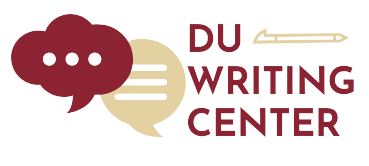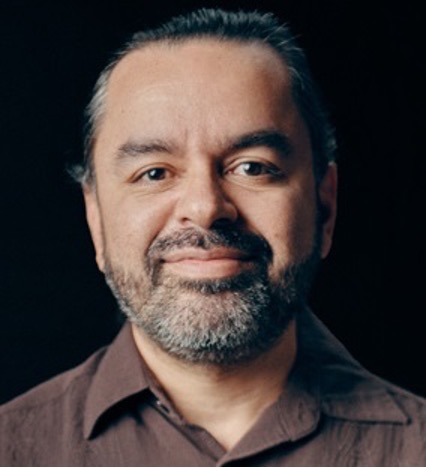By Mina Khadem
This Winter we will be publishing a series of spotlight articles about multilingual students and faculty at DU. These articles are based on interviews that Dr. Kamila Kinyon and a group of multilingual students conducted about interviewees’ lived experiences, including continuing connection to heritage languages, role as writers and teachers at DU, and thoughts about multilingual and multicultural identity. This project is funded by a Faculty Research Fund Grant awarded to Dr. Kinyon for 2023-25. We welcome this opportunity to celebrate DU’s multilingual community.
Our relationships and identities with language are unique and rewarding. Most of us take our linguistic abilities for granted and forget their importance in our globalized world. However, for many, language becomes a way to give back to others, a bridge to connect people together, and a tool to break down barriers that restrict communities. Embracing our linguistic abilities not only expands the world that we know but also provides a colorful insight into ourselves, the people we know, and the people who we have yet to meet. Professor Alejandro Cerón, a leader in his field of anthropology, specifically in relation to health, human rights, culture, and Latin America, offers a unique perspective into his complex and rich world of linguistics and multidimensional fields of study.
Dr. Cerón is originally from Guatemala and speaks a total of five languages. Spanish was his first and primary language growing up, but he learned English and three Indigenous languages, Kaqchikel, Q’eqchi’, and K’iche’, following his time in medical school. He explains that he learned Kaqchikel, Q’eqchi’, and K’iche’ by living and working in an immersed environment, where he helped treat, care, and communicate with people as a physician, along with more “traditional” academic teachings and the world of books. Although Dr. Cerón has not achieved complete fluency in these indigenous languages, he continues to work to maintain and improve his abilities by cultivating knowledge through grammar and vocabulary, with the help of poetry. Nonetheless, his unique skills in Indigenous languages gave him insight into the cultural nuances, traditions, and perspectives of the Indigenous communities, allowing him to do his work more effectively and further spiking his interest in anthropology.
Dr. Cerón shared a story where he had to treat a young boy who was suffering from health problems as a result of extreme dehydration in a remote part of Guatemala. Quickly, he realized that this required a basic IV to treat the patient, but the boy’s parents panicked when they saw the IV. Dr. Cerón explains that with his knowledge of Q’eqchi’ and its linguistic relationships to culture, he realized that the IV was associated with “cold” energy, the same energy that was “infecting” the boy. And it was the understanding of the parents that treating the boy’s “cold” disease with a “cold” treatment would kill him. Having this basic understanding of Q’eqchi’s culture and the language, Dr. Cerón astutely infused the IV with vitamin B, changing the “energy” of the IV to “hot” and addressing the parents’ concerns.
As explained briefly, Dr. Cerón studied and worked as a physician but continued to take classes on public health, and he later became inspired to pursue anthropology. He shared that when he was learning to become a physician, there were a lot of communicative inconsistencies between the patients and the doctors, even though they were speaking the same language. As a result he became curious about how language creates means of words and concepts that were particularly related to health and medicine. After meeting his wife, who is originally from the United States, he got an offer to be a part of a graduate program for anthropology studies at the University of Washington.
As an international student studying in the US, Dr. Cerón shared that this was when he started to struggle for the first time with language. Although he spoke English very well, his accent and the time it took for him to find the right words made communicating challenging and often discouraging during some of his classes in graduate school. However, after some time practicing his English in class in addition to joining a course for international students—many of whom, like Dr. Cerón, were also teaching assistants—he became much more confident in his English and his accent.
He explains that throughout his research career in public health, Spanish has been a constant. During his time in graduate school, he earned much of his funding because he spoke Spanish and was able to open doors in research for the professors he was collaborating with. Furthermore, he was inspired to write a book based on his dissertation, which focused on public health and Guatemala, which he wanted to publish first in Spanish. Initially, he faced a lot of backlash against the consideration of publishing his book first in Spanish, because he was told by other anthropologists that his research would not be as valued if it was in Spanish. He was advised to publish it first in English and then publish a translated Spanish version later. However, after finding a supportive group of other professors at DU, he decided to publish his research in Spanish.
Although multiculturalism and multilingualism can often help build meaningful and fruitful relationships and friendships—particularly with those who share a similar story to oneself—this is still often a disadvantage in the professional world. Dr. Cerón shares that even if you are a good researcher, who has a wide range of experience working with different people due to multilingualism, it is often the case that other professionals or evaluators in your field still only reduce you and the value of your work to your accent. He explains that this is an experience that he shares with his peers who are not native English speakers and are immigrants. While this is an unfortunate reality of the professional world, Dr. Cerón assures that there is space for multilingual and multicultural researchers. He explains that DU can help by “normalizing bilingualism… instead of making it exotic”.
Dr. Cerón inspires as he continues to embrace his multilingual skills in his research and teachings. He emphasizes the importance of creating a welcoming environment for all, which has led him to mentor students who also come from complex linguistic backgrounds. Furthermore, he continues to use this multilingualism in his personal life, as he encourages his kids to be bilingual and to be comfortable with having a multicultural background.
In the end, Dr. Cerón makes it clear that multiculturalism and multilingualism expand one’s world and the power that they have to change it. Not only has this made him a better doctor, researcher, and professor, but a better person and thinker. Dr. Cerón explains that “if you’re a fish, in a fishbowl, you will never see and you will never know about the water around you and how that’s shaping your perception of everything else. You need to step out of the fishbowl to be able to look at the fishbowl you are in… and the other fish bowls”. It is not until we do this that we will have the ability to explore and truly understand our world and therefore make meaningful changes.

